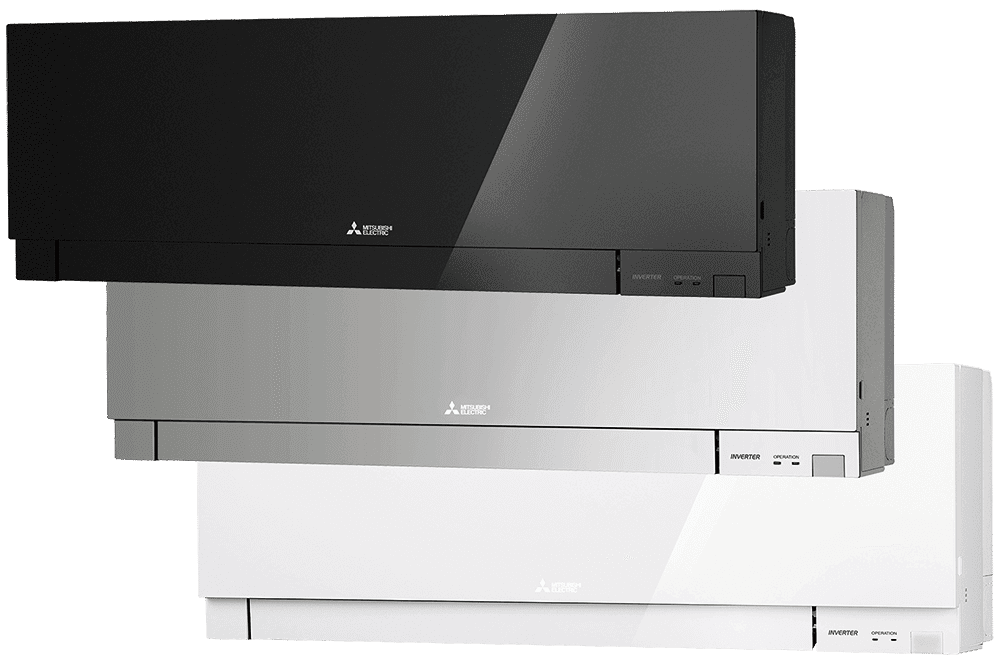Ductless heat pumps are far more efficient than most conventional HVAC systems, and they provide both heating and cooling options in the same system! If you are thinking of acquiring a new HVAC or if your current HVAC system is on its last legs, you may be able to upgrade to ductless heat pumps for greater efficiency, lower overall utility bills, and, depending on where you live, additional savings via rebates and incentives. (Plus, if you have solar, you can use the sun to heat and cool your home!)
Since entering the HVAC market in 1980, Mitsubishi Electric has grown to become one of the leading heat pump manufacturers. They also have the number one ductless product in the United States: the M-SERIES, which includes indoor and outdoor units for both ducted and ductless heat pumps that can be installed in your home. Mitsubishi offers heat pumps for all budgets, with options ranging from good to better to best.
Before we dive into why Mitsibushi electric heating heat pumps are the best in the market today, let us take time to understand what a heat pump is.
What is a heat pump?
Simply put, a heat pump is a HVAC system that transfers heat from one location to another. It differs from other HVAC systems in that it draws heat from the outside and transfers it to the inside using energy. It compresses and exchanges air to raise the temperature of the air and then reverses the process to lower the temperature of the air.
The heat pump is notable due to its ability to cool a house in hot weather and heat it in cold weather. Instead of investing in separate heating and cooling systems, this dual-purpose and energy-efficient system can save a lot of money in the long run.
Whatever the temperature is outside, a heat pump can gather heat from the ground or air outside the home. The pump draws heat into the system, compresses it to raise the temperature of a refrigerant, and then pushes hot air into the home. When the weather gets hot, the system reverses and acts like an air conditioner, transferring heat from inside the home to outside.
Types of Heat pumps
The two most common types of heat pumps are air-source pumps and ground-source pumps.
The heat source is the primary distinction between an air-source pump and a ground-source (or geothermal) pump. Air-source heat pumps consist of an outside unit and an internal piping system that extracts heat from the outside air and moves it inside. This type of heat pump can also be used in conjunction with an air-source hot water heat pump to provide hot water to homeowners.
Ground-source heat pumps gather and transfer heat from the ground using a buried looped pipe system. These pumps are better suited for larger properties where the pipes can be installed into the ground. Ground-source pumps are also more efficient in the winter because they tap into the consistent thermal energy beneath the ground.
Important Features of Mitsubishi Electric Heat pump
Mitsubishi heating and cooling units are one of the most reliable HVAC systems in the market today. As a company, they strive to produce top notch heating systems that last for decades. Here are some of the key features of Mitsubishi heat pumps:
Mitsubishi heat pump performance
Mitsubishi air source heat pumps come in a variety of styles, ranging from low-cost to high-end. Most models are ENERGY STAR qualified and provide above-average to exceptional heating and cooling performance. Mitsubishi heat pumps employ inverters to regulate conditioning automatically when temperature sensors detect even little changes. These inverters provide greater performance by delivering maximum power while using the least amount of energy. They take pleasure in providing quick, comfortable operation while maintaining minimal operating costs.
Furthermore, depending on the model, the heating capacity of numerous indoor units in Mitsubishi Electric multi-zone systems can greatly exceed the output of the individual indoor unit. One 8-zone system, for example, can provide 65,000 BTU/H of heat at 47 degrees outdoor ambient temperature, whereas a 2-zone system may produce 25,500 BTU/H under the same conditions.
SEER ratings and cooling performance
When evaluating heat pumps, one performance number to consider is SEER, which evaluates cooling efficiency. The Air Conditioning, Heating, and Refrigeration Institute (AHRI) rates the efficiency of central air conditioning systems using a Seasonal Energy Efficiency Ratio (SEER), which means your heat pump is assessed similarly to an air conditioner. In general, the higher the SEER, the less electricity the system need to function. Mitsubishi heat pumps provide excellent cooling efficiency, with up to 33.1 SEER, whereas other heat pumps on the market only provide 13 to 31 SEER.
HSPF ratings and heating performance
Another factor to consider when comparing heat pumps is the Heating Seasonal Performance Factor (HSPF). The higher the HSPF rating, the more efficient a heat pump is at heating, resulting in less energy utilized and greater overall energy savings. ENERGY STAR heat pumps must have an HSPF of at least 8.5, but heat pumps can have up to 14 HSPF. So, up to 13.5, Mitsubishi HSPFs are considered high-end.
The kumo cloud app
The kumo cloud app, which is accessible on iOS, Amazon App Store, and Google Play, is used by all Mitsubishi heat pumps. On your smartphone or tablet, you may manage temperature preferences for your heat pumps using the kumo cloud app. It also integrates with Google Assistant, Amazon Alexa, and IFTTT Applet Integration to control transfer fans and lighting. You can simply control temperatures, alter fan speeds, create modes and tailor schedules, monitor the status of your filters, and even manage the operation of third-party furnaces, boilers, heaters, humidifiers, and dehumidifiers using the app.
Appearance

Image source: Mitsubishi Electric
If you dislike the appearance of typical mini split units, the EF Designer Series may be for you. They feature a sleek appearance that is maintained whether they are on or off.
Furthermore, Mitsubishi's FS Deluxe Series includes outstanding technology and features, such as its 3D i-see Sensor, an infrared-ray sensor that analyzes temperatures at various points across the space. It uses many sensors to assess the temperature of the room in three dimensions, detecting the location of individuals in the room.
The FS series also includes a Dual Barrier Coating applied to the interior of the unit to protect it from dirt, dust, and oil buildup, which helps reduce maintenance and increase long-term efficiency.
Mitsubishi’s warranty coverage
Any Mitsubishi Electric heat pump system purchased from and installed by a licensed HVAC contractor in the continental United States, Alaska, and Hawaii on or after May 1, 2019, comes with the following warranty to the original owner: if your heat pump system is installed in a residential single-family home and registered within 90 days of installation, the parts and compressor have a 10-year warranty available to the original owner as long as they resale within 90 days of installation. All parts have a five-year warranty regardless of registration, and the compressor has a seven-year warranty.
Additionally, if you get your Mitsubishi heat pumps installed with a contractor in Mitsubishi’s Diamond Contractor network, your equipment warranty increases to 12 years for parts and the compressor.
Do Mitsubishi heat pumps work in cold climates?
Early heat pump technology was not recognized for heating in extreme cold, but technology has evolved significantly, and many heat pumps now perform in temperatures as low as -10 degrees. Mitsubishi heat pumps feature Hyper-Heating INVERTER (H2i) technology, which can deliver up to 100 percent heating capacity at 5° F and continue to operate at -13° F even without auxiliary heat. Certain models may even provide 100 percent heating capability down to -5° F.
Sizing and installing your Mitsubishi heat pumps
Working with a reputable heat pump contractor is essential not just to assure appropriate installation to maximize your system's performance, but also to advise you through the design and size of your heat pump system. An enormous system will cost more to build and will be inefficient, whereas an undersized system will not offer sufficient support to heat and cool your house.
The number of Mitsubishi heat pumps you'll need will be determined by your heat pump contractor depending on the size of your home and living area, location, temperature preferences, and insulation quality.
Is a Mitsubishi heat pump right for you?
Mitsubishi is a well-known and reputable brand of heat pumps. With their selection of ducted and ductless heating and cooling solutions, as well as levels ranging from more economical to premium, you're sure to find something to suit your demands and budget. Your best bet is to consult with a professional near you to understand which Mitsubishi heat pumps would be ideal for you when planning your heat pump system.
AirPlus Is Northern Virginia's Mitsubishi Electric Diamond Preferred Contractor

.2309121422550.png)

